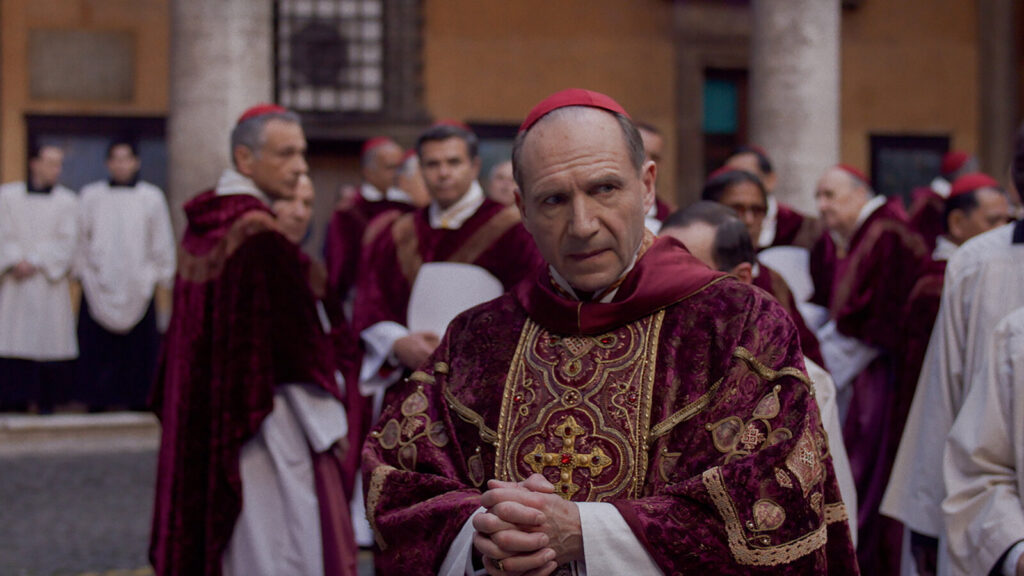[Editor’s Note: spoilers ahead] Advertised as a shocking political thriller, most of Conclave’s twists and turns are easily anticipated. Its central theme, the need for the Roman Catholic Church to doubt itself and adopt relativism, divorces the film from the moral framework needed to be truly thrilling.
It is a picture that celebrates doubt, at least where religion is concerned, but the best cinematic thrillers have a moral certitude even if the audience is initially unaware. This invites us to ask what the purpose of shock is and why we long for it.
Directed by Edward Berger, Conclave begins with the death of an unnamed Pope and follows the convening of the College of Cardinals to select the next pontiff. All of the initial candidates are eliminated due to various scandals. Throughout, the more liberal cardinals (portrayed as “the good” cardinals) want to push the church away from tradition, whose advocates are portrayed as bigoted and repressive.
The movie constantly reminds the audience of the need for doubt within the Church, most notably when Ralph Fiennes’ Cardinal Lawrence sermonizes, “Certainty is the great enemy of unity. Certainty is the deadly enemy of tolerance…Our faith is a living thing precisely because it walks hand in hand with doubt.”
This culminates in the final “surprise” ending where the new Pope, unbeknownst to the College of Cardinals, is an intersex woman.
People fascinated by the prospect of Vatican intrigue might find the film of interest, but it isn’t thrilling. Unwilling to take risks, filmmakers are disinterested in debate even about the ideas Conclave attempts to advance. It states the ideas and then all central characters act as one would expect. The fact that the Church has had financial or sexual scandals is not revelatory, and in Conclave, it is easy to predict both who will be ensnared in scandal and whom the next pope will be.
Especially obvious is when Carlos Diehz’s Cardinal Benitez insists, “The Church is not the past. The Church is what we do next.” This is the speech that ultimately gains him the papal mitre.
The lack of shock value is so notable that the director, in an interview with Vanity Fair, claimed it was intentional, wanting the end reveal “to feel very natural and soft.”
Thrillers and suspense movies need moments of deep revelation that shock the viewer to be drawn in. But, with Conclave, the viewer sits outside judging the church for its failures. In order to shock, the audience must come into contact with the truth.
Author and devout Catholic Flannery O’Connor, whose stories do shock, wrote, “It is the business of the artist to uncover the strangeness of truth.”
The best thrillers are not for the sake of shock but to bring audiences into contact with truth, preferably the truth of themselves. But a film that has from its outset done away with certainty and wished to upend an intuition whose purpose it is to point people to Christ, who is “the truth”, cannot do that. Because the foundation of the Church is Christ it cannot become relative. One only has to look at the rapid decline of liberal churches to see what happens when they attempt this.
Director Alfred Hitchcock, often called “the master of suspense”, was himself Catholic. One significant reason his films endure is the ability to thrill the audience, and not just with car chases, heists, and surprising twists, but they shock the viewer with what they reveal about them. Many of Hitchcock’s movies ask a moral question of his audience, and his genius is to lure them, for a time, away from morality before shocking them with the truth.
But this required Hitchcock to have a concrete sense of truth in order to misdirect his audience. In Rear Window, the viewer becomes the voyeur, in Rope the Übermensch, and in North by Northwest the utilitarian. The ultimate twist is not what any particular character does but that you the viewer have been so easily led down the path of sin with them, sometimes completely unconscious. Often, we must be shocked with our need for grace. Fortunately, for those who recognize this, there is an institution to which they can turn, one that is certain of the human condition and what must be done to free us from our sin.
Interestingly, Hitchcock’s overtly Catholic I Confess was about the need of church leaders to have certainty even when others encourage them to doubt. In this movie, a priest, falsely accused of murder, can only prove his innocence through breaking the seal of the confessional.
Hitchcock thought it good that a priest would not do so. He stated, “We Catholics know that a priest cannot disclose the secret of the confessional, but the Protestants, the atheists and the agnostics all say, ‘Ridiculous. No man would stay silent and sacrifice his life for such a thing.’”
Viewers leaving Conclave can do so comfortably, perhaps even feeling morally superior to what they just saw on the screen, but this is not an enduring thrill. Art that endures shocks with truth, not cheap political points. When people do encounter truth, they need the Church to have the conviction necessary to point them to its ultimate source, Jesus Christ.






Comment by David on April 18, 2025 at 8:57 am
The “surprise ending” recalls the legend of Pope Joan, who worked her way up the church’s ladder to the highest office. Her undoing was getting pregnant by an advisor, then giving birth on the street during a procession. The tale was widely believed to be true in the Middle Ages and very popular in the antipapal Reformation, but is considered fiction today.
The film was “pretty” given its grandiose venue. The white umbrella scene was striking, but I found it somewhat mediocre.
Intersex does happen in perhaps 1 in 2000 live births. I recently read an account of the plight of a child who had partial androgen insensitivity and “mosaicism”—having both XY male and XX female cells. The parents decided to wait until the child was firmly established in gender identity before any drastic surgery. After first identifying as a girl, he prefered to be a boy and the parents were glad they had waited.
Comment by Paul on April 18, 2025 at 6:35 pm
As a former Catholic, I was mesmerized with the pageantry and costumes. I too was shocked at the ending and outside the theater I had a discussion with two other people who saw the film as we tried to figure out what we witnessed.
Comment by Fr. Dale Coleman on April 19, 2025 at 2:47 pm
I agree with the writer with two caveats.
#1 The word is uninterested not disinterested. The first is not interested. The second is impartial.
#2 Somewhat strange to use Hitchcock given his obsession and mistreatment of several of his leading blonde actresses. He destroyed Tippi Hedron’s sanity. He was a monster.
Comment by Nikolaus on April 19, 2025 at 5:42 pm
I think this is the first time I’ve paid attention to anything about this movie. That Hollywood presents Leftists as good and traditionalists as bad is a great, big yawn. But I have to admit that I was shocked to hear that Hollywood’s pope is an “intersex woman!” There really is no shame in our society.
Comment by Thomas on April 21, 2025 at 9:02 pm
I haven`t seen the film. It really tries to portray the Church as anticlericals or those want to destroy it would like it to become. But I think the pope in the film in fact is a male intersex. The novel also finishes this way.